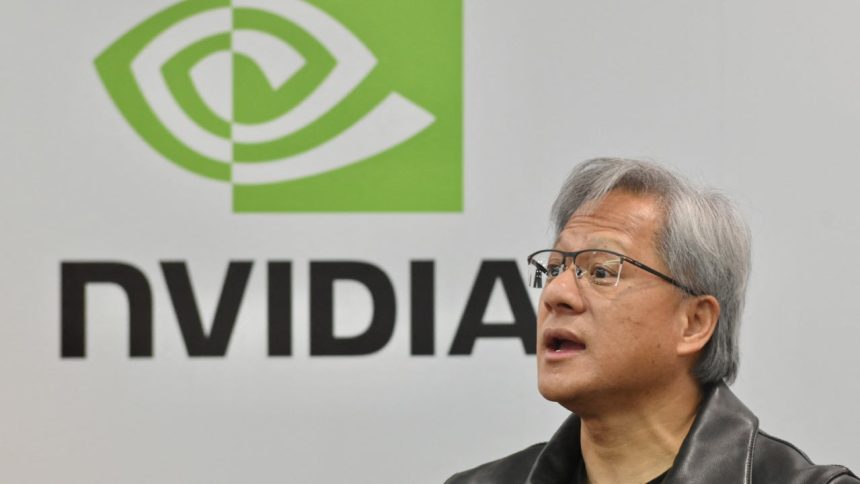The business of chipmaker Nvidia has shown outstanding growth in recent years, fueled by the boom in artificial intelligence, regularly driving its stock price to new record highs. The stock is up more than 200 percent in the past year alone, and has risen about 10-fold over the past four years.
Nvidia is set to report first quarter results Wednesday and analysts expect another quarter of exceptional growth. Here are three things that could send Nvidia’s stock even higher and some risks investors should watch out for.
Nvidia stock: Three things that could send it even higher
1. Strong business results
Ultimately, the performance of any stock is driven by the underlying business’ results over time and Nvidia’s results have been nothing short of extraordinary. Nvidia’s most recent fiscal year saw the company produce nearly $61 billion in revenue, up from about $27 billion in the previous year.
In the first quarter of its 2025 fiscal year, Nvidia is expected to report revenues of $26.4 billion, up from about $7.2 billion in the same quarter last year, according to Yahoo Finance. Profits are also expected to grow substantially to $5.58 in non-gaap EPS, up from $1.09 in the year ago period.
“[Data center] revenue appears to be constrained by supply, and we think Nvidia will continue to steadily boost revenue in each of the four quarters in fiscal 2025 as more supply comes online,” Morningstar analyst Brian Colello wrote in a note to clients.
2. A long runway for growth
A key question for Nvidia investors is how long can the company’s meteoric growth last? The growth is being fueled by massive demand for the company’s chips by tech giants such as Microsoft, Alphabet and Meta Platforms, as they build out their AI capabilities.
There’s no doubt that growth will slow at some point, but when exactly that comes is difficult to know. The longer the company can grow, while doing so profitably, the better off investors will be.
“The rapidly evolving AI market is crucial to the firm’s long-term valuation, but we still have many questions about these markets,” says Colello.
3. A reasonable valuation
A company’s valuation can have a major impact on its future stock performance, with high multiples sometimes acting as an anchor on the stock price. But Nvidia trades at a fairly reasonable valuation when you factor in the company’s growth rate, which causes some investors to be bullish on the outlook.
“From a valuation perspective, [Nvidia’s] forward PE is in fact 15% below its average for the past 5 years,” investor Dan Niles said in a tweet ahead of the company’s first quarter results. Niles said that expectations are high for Nvidia, but ultimately he expects the stock to triple or quadruple from current levels over the next 3-4 years, though he noted he expects several drawdowns during that time frame.
Nvidia stock: Risks to watch out for
1. High expectations
The company’s strong results have led to high expectations for the stock and the company’s performance. For a company of Nvidia’s size to more than triple revenue year-over-year is extraordinary and not easy to achieve.
If the company fell short of the market’s expectations for growth or profitability declined, the stock could suffer.
2. Long-term competition
Nvidia is the current leader in its markets, but over time competition will increase as more of its tech giant customers try to design chips in-house, to reduce their reliance on Nvidia. How the market evolves is very difficult to predict, but it seems likely competition will increase over time.
“In the long run, we expect tech titans to strive to find second-sources or in-house solutions to diversify away from Nvidia in AI, but most likely, these efforts will chip away at, but not supplant, Nvidia’s AI dominance,” Colello says.
3. The chip business is cyclical
The semiconductor industry has historically been cyclical, experiencing periods of growth and high profits that are followed by slowdowns and losses. There’s not much debate that the chip business remains cyclical, but how that cycle is impacted by the current AI boom is up for debate.
Investors should consider if they think we’re early in the cycle, with plenty of growth and profits ahead, or if we are near the peak, in which case it may make sense to avoid chip stocks until the next cyclical trough.
Editorial Disclaimer: All investors are advised to conduct their own independent research into investment strategies before making an investment decision. In addition, investors are advised that past investment product performance is no guarantee of future price appreciation.
Read the full article here














